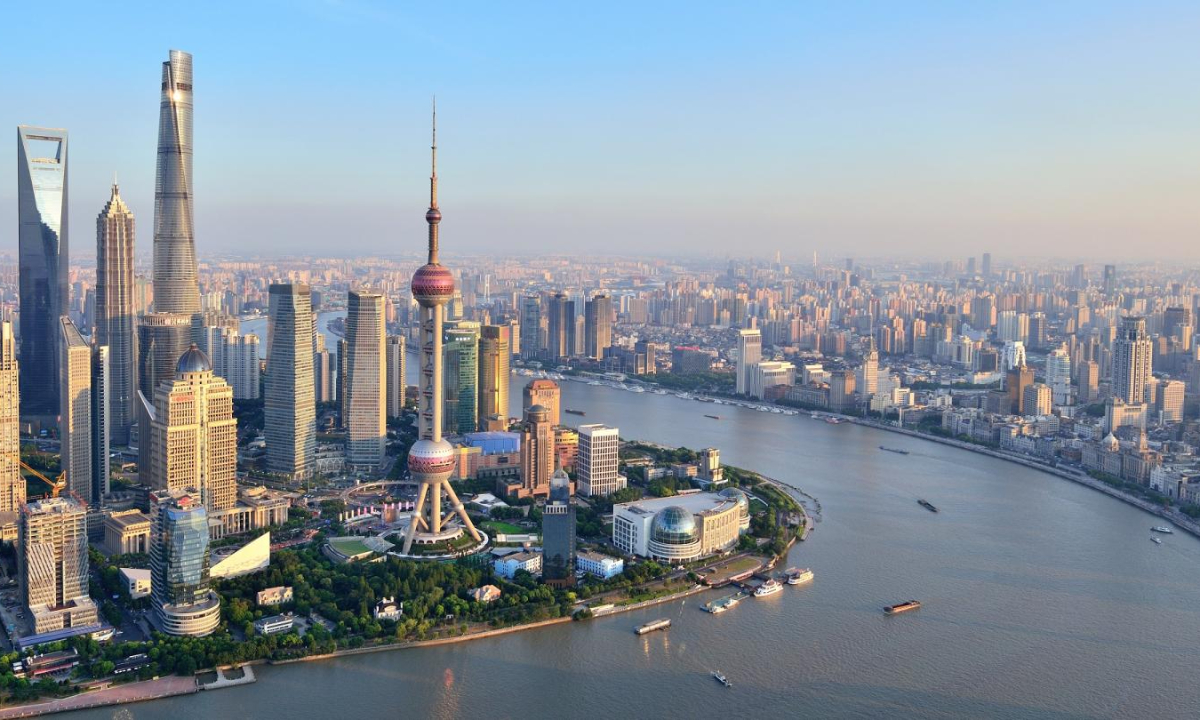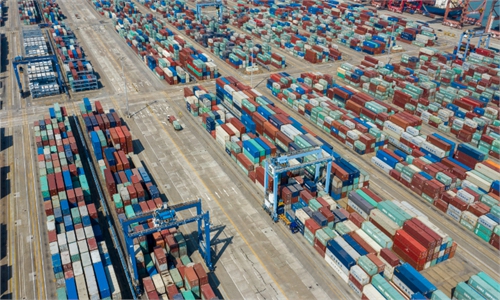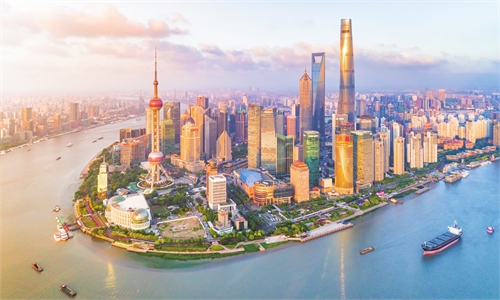China to enhance communication with foreign enterprises to attract more global resources

Lujiazui area in Shanghai Photo:Xinhua
China will formulate comprehensive policies to further attract foreign investment, expand market access and enhance communication with foreign firms and chambers of commerce, in a bid to set up a higher-level opening-up system and attract global resources, the National Development and Reform Commission (NDRC), the country's top economic planner, said during a press conference on Tuesday.
Experts noted that despite calls in the West for "decoupling" or "de-risking," China is showing that its door will only open wider, and the NDRC's efforts will further create a favorable investment environment and lift the country's opening-up to new level.
Jin Xiandong, an NDRC official, said on Tuesday that China has been an important power source and ballast for the stable growth of the global economy. In the longer term, the country will continue to provide strong impetus for the recovery and growth of the world economy, and will surely bring more permanent development opportunities for foreign enterprises, Jin noted.
The NDRC will formulate policies to attract more foreign investment, expand market access and comprehensively optimize the business environment, Jin said.
It will strengthen communication with foreign enterprises and foreign chambers of commerce, coordinating and addressing in a timely manner the problems and reasonable demands reflected by enterprises, and facilitating the conditions for enterprises to invest and produce in China.
"Remarks made by the NDRC expressed China's welcome for foreign enterprises, as well as the country's determination to build a fair, transparent business environment," Li Yong, a senior research fellow at the China Association of International Trade, told the Global Times on Tuesday.
For foreign enterprises that have not yet entered the market, China's support policies may accelerate their decision-making, and the policies will also encourage foreign enterprises already in China to expand their investment, Li noted.
Minster of Commerce Wang Wentao met with Chairman of Japan China Investment Promotion Organization (JCIPO) Yasuhiro Sato on Monday and held a roundtable discussion with representatives of Japanese enterprises in China, hearing about operating conditions, offering advice and answering questions.
Wang emphasized that opening-up is China's basic policy and wished that the JCIPO could be a bridge for bilateral business and trade cooperation. Wang vowed to deepen communication with Japanese enterprises to improve the business environment.
Sato said China is an important market for Japanese enterprises, and most of the members expressed a willingness to further invest in China, noting that the JCIPO will make efforts to strengthen bilateral cooperation.
The Chinese government has been emphasizing the importance of building regular communication with both domestic and foreign enterprises, which sent a strong signal about China's determination to further improve the business environment, Dong Shaopeng, a senior research fellow at the Chongyang Institute for Financial Studies at the Renmin University of China, told the Global Times on Tuesday.
"Aside from improving and amending the negative list in free trade zones and ports, a regular communication mechanism is helpful for learning the real needs of foreign investors," said Dong, noting that the mechanism may boost coordination between the government and enterprises, and solve problems as soon as possible.
Recently, executives of multinational corporations have been visiting China, which is a "vote of confidence" in China's business environment and development prospects, and also shows that "cooperation with China is to walk with opportunities, and to invest in China is to invest in the future," Jin said.
In the first five months, the actual utilization of foreign investment in China's manufacturing sector increased 5.9 percent year-on-year, and that in the high-tech industry rose 7.5 percent. Those results were not easy to achieve amid the global economic slowdown and the spillover effects of monetary policy adjustments in developed economies, according to Jin.
China also made contributions to facilitate worldwide investment, leading the construction of high-standard international rules, Li added.
China played a key role in concluding negotiations on the text of the world's first multilateral investment agreement, known as the Investment Facilitation for Development (IFD), a Commerce Ministry official said on July 7.
As the world's first multilateral investment agreement, the IFD agreement aims to improve the transparency and predictability of investment measures, speed up and streamline investment-related administrative procedures, and enhance sustainable investment.
China provided pragmatic solutions for disputed issues during the negotiations, and made key contributions to their successful conclusion, receiving high recognition from the parties involved, the official said.


